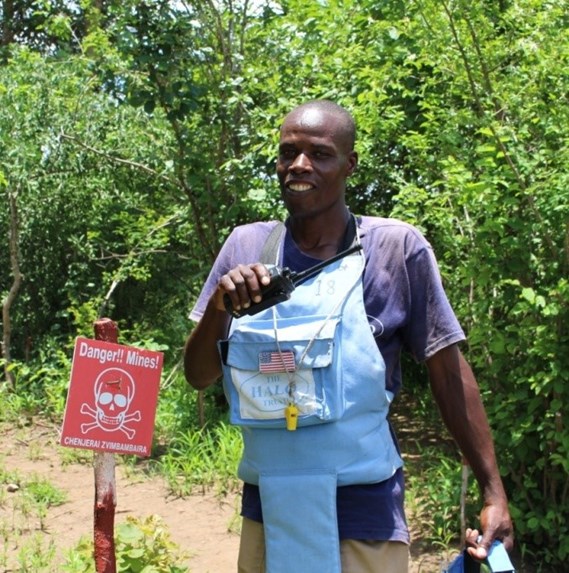Alec Zhoya (39) is a Section Commander for HALO Zimbabwe, managing a team of eight deminers who are clearing mines from some of the world’s densest minefields along the Zimbabwe-Mozambique border.
Zhoya is from Foya village where he lives with his wife and three young children. He was orignlly a farmer like the majority of those living in his village, growing subsistence crops such as maize and groundnuts on his two hectares of land. However, this part of Zimbabwe is highly susceptible to flooding and drought. As a result, families are unable to rely on agricultural activities, and the region is consistently categorised as stressed or in crisis according to the Famine Early Warning Signs Systems network. Therefore, in the past he tried to support his agricultural activities by finding other employment.
There are very few employment opportunities such rural communities, but in 1998 he found work as a general hand for a commercial demining company working on the border near his village. After two years the company left. Unfortunately the work was not completed under this contract, and the remaining mine problem has continued to have a devastating effect on the local community; claiming lives and limbs, denying prime agricultural land, and killing valuable cattle vital to rural livelihoods.

Zhoya’s experience as a general hand, coupled with his extensive local knowledge from working the ground meant he had an excellent understanding of the local mine threat. He quickly became an important informant for HALO’s survey of the area in 2013, and was hired as a deminer. He demonstrated good leadership qualities and commitment to his work, and was subsequently promoted to Section Commander in January 2014. Local employment is extremely important in HALO, not just because it drives money back into remote communities who continue to be affected by the presence of mines, but also because these staff have local knowledge that is crucial to the accurate delimitation of minefields.
Zhoya still cultivates his land, but this year El Nino conditions had caused the lowest recorded rainfall between October and December in Zimbabwe since 1981 and his crops are suffering. However, his employment with HALO still provides a regular income in order to support his family. But others in his community with small land-holdings due to mines are not so lucky. Zhoya and his team are working hard to free up more land to allow farmers to diversify, giving them greater resilience to climatic shock. Until last year, the area directly opposite Zhoya’s house was mined. Now 13,635km of frontage has been cleared by HALO. But the work doesn’t stop there, an estimated 60,953km remain in this district alone, and the livelihoods activities of rural families continue to be restricted by the devastating legacy of a civil war that ended over three decades ago.
Zhoya is well-respected in his community due to his role in demining. He says
‘now I do this kind of work, I don’t switch off from it. Even when I am home with my family I am HALO’.
This is an important benefit of local employment, with well-respected individuals becoming a focal point for disseminating safety messages amongst at-risk communities.
The implementation of mine clearance activities has had a dramatic effect in this area, freeing up prime agricultural land for the local population, and providing stable employment in an area where development has been restricted due to the presence of mines. Further support allows young men and women in other vulnerable communities opportunities to play an essential role in ridding their communities of this deadly legacy through reliable employment with HALO.




 Visit our HALO USA website
Visit our HALO USA website
